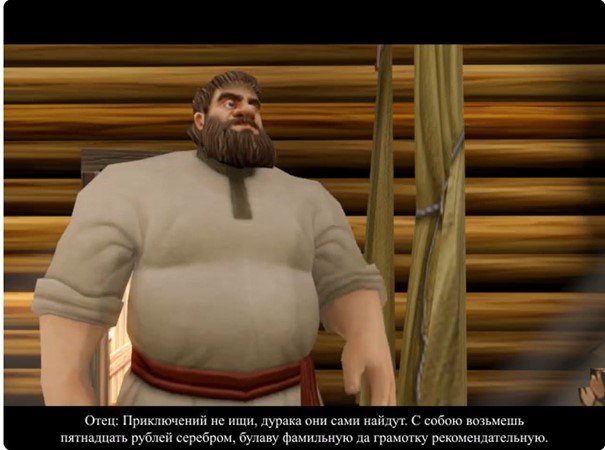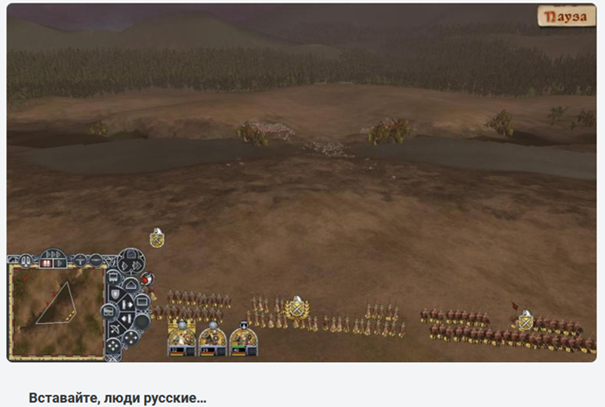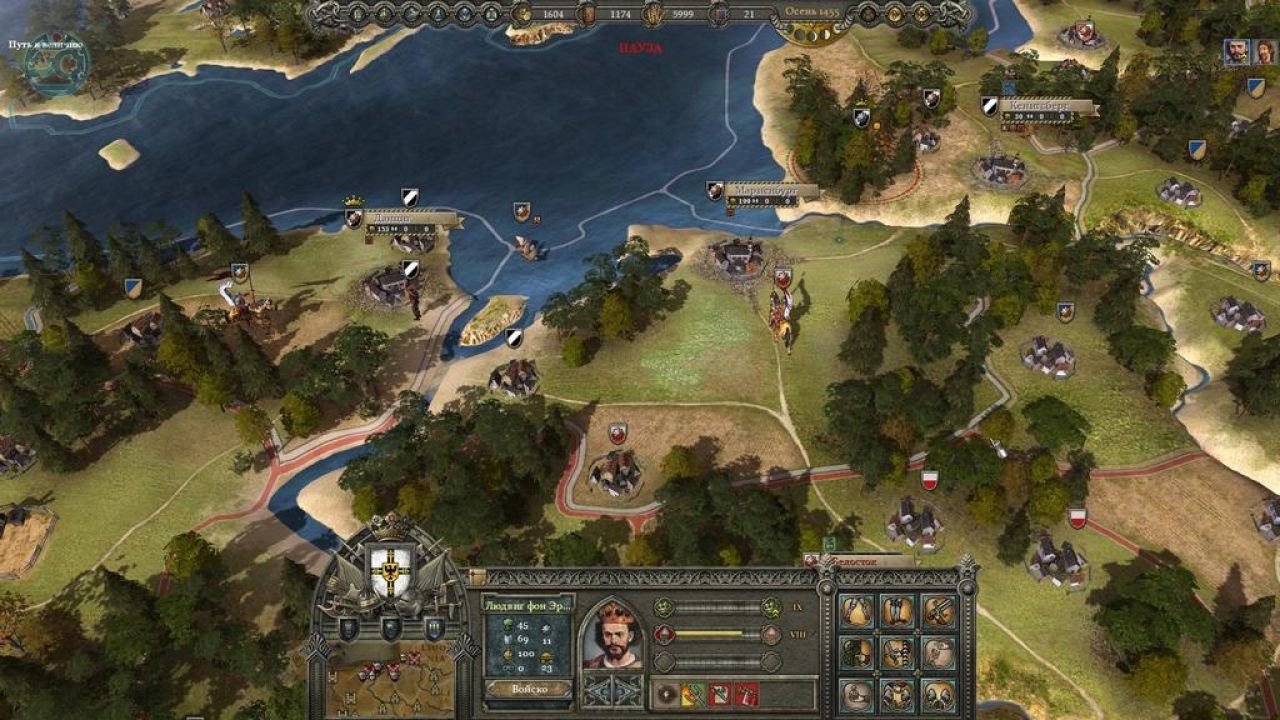By Kristina Wittkamp (Universität Passau)
Watch the presentation of the paper here: https://youtu.be/i1D6pzZ-3BA
Computer games as an important part of our media-related participative environment enable audiences, players and prosumers (hybrid of consumers and producers) to use various modes of reception. Therefore, playing and its perception constitute basic categories of human (inter-)action and agency (adapting Johan Huizinga’s dictum).
By analyzing depictions, receptions and perceptions of Eastern Slavic medievalisms concerning Rus’ in selected Russian-language computer games, pattern of retrospective communication of playing practices, imaginations and usages of these virtual constructions and emotional perceptions emerge.
Regionalisation of a specific Rus’ian medievalism
Rus’ian medievalism instrumentalizes the history of Rus’ (especially Kyivan Rus’) for peculiar purposes by emphasizing the Eastern Slavic region and its role within Europe and European history. Players of the military historical strategy game Imperija: Smutnoe vremja (Empire: Time of Troubles, released in 2009) claim to play this Europa Universalis clone because it is presumably designed for its Eastern European audience living in swamp lands. Therefore, producers create familiar products for their local audience by perpetuating common clichees. The biased discourse capitalistically promotes that game to its consumers.
Another vivid example provides the epic folklore-fantasy mix RPG Ostrov Rus’ (Island Rus’, released in 2008). The interchangeable adventure story line takes place with Kyivan Prince Volodymyr’s warriors in a scenario visually related to the since 2004 produced Russian cartoon series Bogatyri.
The gaming community surpasses here the mere consume-oriented experience by creating and sharing own content. By composing game video-scenes into short films, the new product re-narrates the gaming experience. Therefore, the community prosumes the content via different medialities.

Finding a specific place for Eastern Slavic fantasy medievalism between roleplaying and stereotypisation
An example for percepting Eastern Slavic folklore is the fantasy game Vorona (Crow, released 1992). In the beginning of the 1990s, rediscovering (Eastern) Slavic folklore correlated with an ‘own’ renewed identity construction. Despite its demanding gameplay, its former players therefore remember its cultural impact becoming producers of cultural discourses, as Kirill Korolev suggests: “[…] the history of virtualisation of the Slavic sphere started in 1992 with the game Crow […] where they used stereotype images of the Russian past. It became quite popular, because characters like [witch] Baba Jaga or [three-headed dragon] Zmej Gorynyč could compete with foreign elves and gnomes.”
Rus’ian medievalism as (indigenous) culture of distinction
Not only folklore-fantasy features work for cultural self-identification. Historical strategy games simultaneously embed Rus’ian into European history distinguishing peculiar developments. Especially the XIII vek-(13th century-)series (released since 2007), anticipated as a Medieval Total War clone, instrumentalizes a specific image of Novgorodian Prince Aleksandr Nevskij. By alluding to film citations and images of the 1938 Ėjzenštejn-film Aleksandr Nevskij, the gamers produce and participate in new interpretations of its contents, thus creating a discoursive intermediality.

Concluding, as computer games include cross-media related reciprocities and hybridities, a reception and production centered analysis enables insights into selective and functional prosumtions of the past.
Selected Bibliography
Albin, Andrew, Erler, Mary C., O’Donnell, Thomas, Paul, Nicholas L. and Rowe, Nina: Whose Middle Ages?: Teachable Moments for an Ill-Used Past, New York, USA: Fordham University Press, 2019.
Alvestad, Karl C./Houghton, Robert (Hg.): The Middle Ages in Modern Culture. History and Authenticity in Contemporary Medievalism, London 2021.
Chapman, Adam: Digital games as history. How videogames represent the past and offer access to historical practice, New York 2016.
Domsch, Sebastian: Storyplaying. Agency and Narrative in Video Games, Berlin/Boston 2013.
Frissen, Valerie et al. (Hg.): Playful Identities. The Ludification of Digital Media Cultures, Amsterdam 2015.
Heinze, Carl: Mittelalter Computer Spiele. Zur Darstellung und Modellierung von Geschichte im populären Computerspiel (= Historische Lebenswelten in populären Wissenskulturen, Bd. 8), Bielefeld 2012.
Houghton, Robert (Hg.): Playing the Middle Ages. Pitfalls and potential in modern games. First published. London, New York, Oxford, New Delhi, Sydney: Bloomsbury Academic 2023 (New directions in medieval studies).
Huizinga, Johan: Homo Ludens. Versuch einer Bestimmung des Spielelementes der Kultur. Akademische Verlagsanstalt Pantheon, Basel 1938.
Kerschbaumer, Florian/ Winnerling, Tobias (Hg.): Frühe Neuzeit im Videospiel. Geschichtswissenschaftliche Perspektiven, Bielefeld 2014.
Lackner, Thomas: Computerspiel und Lebenswelt. kulturanthropologische Perspektiven, Bielefeld 2014.
Marchart, Oliver: Cultural Studies. UTB 2008.
Välimäki, Reima (Hg.): Medievalism in Finland and Russia. Twentieth and Twenty-First Century Aspects. London, New York 2022.

This is a really interesting paper, thank you so much. I was wondering if you could share any more about the sound/audio aspect of language in the games you have looked at, are voice overs often done in accurate accents? And if not, how does this effect the way Slavic cultural identities are conveyed by the game or received by players?
Thanks for your intriguing remarks, Tess! Language and soundscapes are obviously important parts for creating certain images and identities. Therefore, we need to investigate them more profundly.
Concerning the 13th century-/XIII vek-series: voice overs in the English version are not done with Slavic sounding accents. The Russian version also does not emphasize any regional dialects for example. Likewise, it does not sound antiquated or feigned Old-Slavonic. For Imperija/Empire, the situation is quite similar. The users/players usually perceive these strategy games as their “native” reply to popular Western series (like the Total War series), emphasizing the role of the Eastern European/Slavic campaigns for European history (relying on prevalent established historical narratives often dating back to Soviet period historiography). Therefore, they rely more on the historical setting and constructed military narrative than on the conveyed atmosphere (by sound or language).
Vorona/Crow (as an old DOS-game) does not use any spoken dialogues nor language fragments during game play. The musical soundscape is also only loosely connected to its topic. There is an English version of that game, but I think the outcome would be quite similar.
Ostrov Rus‘, though, especially in the short films, uses feigned old-fashioned Russian, therefore creating the perfect soundscape and setting for a folklore-based RPG. The used language, obviously, is not a type of “real” old Eastern Slavonic language (concerning language linguistics). Therefore, it rather seems to orientate on a Russian audience. These depicted folklore topics, however, are also known in other Eastern Slavic communities (Ukraine, Belarus’) and vary regionally. While researching for my paper, I did not occur any disputes concerning that game’s depiction of Rus’ or Eastern Slavic legacy (e.g. no discussions nor quarrels in youtube comments like widely appearing in reviewing XIII vek-series gameplay and scenarios). I am not sure at the moment, if there is an English version or a translation of that game (and how it could sound). But that would be interesting and worth investigating!
Concluding, I would remark that sound plays an important role in constructing certain identity images and immersing atmospheres, especially for RPGs (in dialogues, presenting folklore/Old-Rus’ settings familiar to its audience). Strategy games operate more with “typical” medieval sounding music (using “typical” instruments), therefore being quite interchangeable with popular Western formats and creating a widely known and accepted medieval/mediavalist atmosphere.
Thanks so much for your answer and giving so many interesting examples, and I hadn’t really thought about the differences in translated versions of a game compared to a game originally written in a language – lots of food for thought, thank you!
Thanks for your thoughtful remarks, Tess. Maybe we should include rather fruitful aspects of liguistics and translation studies into our analysis. I think we’re onto something quite important 😊
Thanks for this, Kristina! There’s a couple of bits of the reception side I’m interested in your thoughts on – particularly whether these Rus’ elements have significant Belarusian and Ukrainian reception, and how that compares with their use in Russia proper.
In the last title in your written version, you also use the concept of indigeneity regarding Rus culture. Whilst I see what you mean, how (both for your work and for the reception of the original pieces) do things square between concepts of indigeneity for east Slavic cultures and the position of Russia specifically as to this day very much an imperial centre dominating many populations that do not have this particular heritage (whether in the North Caucasus, Siberia, Crimea, etc).
Thanks for your brilliant remarks, James! Reception and indigeneity are widely discussed topics in Eastern European history, especially concerning decolonizing “traditional” Russia-orientated history.
A few remarks are already mentioned in my reply above, but I would like to emphasize one important aspect: Especially the 13th century-/XIII vek-series (and Imperija, too) and its campaigns are vividly discussed by its players/users/consumers. There are blog posts and comments full of various discussions instrumentalizing this “indigeneous” (but Russia-centered) history. They center around Alexander Nevsky and his battle against the Teutonic Knights (perpetuating Soviet history discourses about defending the Russian homeland/Rus’), emphasizing the seemingly special role of Novgorod among other Rus’ian Principalities, Nevsky’s presumed independent rulership and interaction with Mongol sovereigns. These topics are far too often related and pursued in comments’ sections to the discussion and demonstration of a presumed Eastern Slavic unity in the Middle Ages (while neglecting regional differences and various developments in the different Rus’ian principalities). Therefore, they perpetuate prominent historical discourses misused nowadays for propaganda and geopolitic purposes, as the Russo-Ukrainian War unfortunately demonstrates.
These narratives and discourses are, of course, highly disputed and widely critically discussed in various comments’ sections – Russian, Ukrainian, Belarus’ian and various other positions deconstruct them critically, often using history/historical facts as basis for their argumentation (proving e.g. that there has never been an Eastern Slavic premordial unity by using linguistic approaches).
There are certainly a few common points for Russian, Ukrainian and Belarus’ian reception – strategy games like the above mentioned series equipped these communities in the post-Soviet period with a peculiar agency for estimating and emphasizing their role for common European history – these games were often designed to become a “better” version of already established comparable well-known formats (though it did not fully turn out that way, often they turned out as a cheap replica with worse gaming experience). This gained self-esteem, however, would become a common feature for its players crossing national boundaries (especially visible in nostalgic remarks and reminiscences). Additionally, studios producing these games in the early 2000s were often bi-national or mixed-national (often combining Russian and Ukrainian teams), therefore, the aggressive politization of this issue is a mere recent phenomenon.
Concerning indigeneity in the context of a (post-)imperial conception, as indicated in your last remark: This is a very important point worth deeper investigation – I first thought about including it into my paper… Honestly, I did not yet analyse the reception modes in the peripheral regions of the former Russian Empire – but I know for example that Central Asia and its former Soviet Republics pursue their own medievalism emphasizing the role of the Golden Horde (e.g. Genghis Khan, Batu Khan etc.). Therefore, I assume that Crimea and North Caucasus also conduct their own medievalisms and identity constructions – Crimea especially with the Crimean Tatars. These regional/local identities therefore can propose alternative identities, but they can also merge or amend Russian narratives not opposing them absolutely. This is a vast area for future research absolutely worth investigating (especially including the decolonized/postimperial perspective). Here, for example, the folklore topics of the RPG Ostrov Rus’ are not critically discussed in non-Russian communities (maybe because these depicted narratives are so widely spread that they do not provoke opposing discourses, maybe RPGs are not taken seriously for identity/indigeneity formation…). But what is worth mentioning – Ostrov Rus’ (and the cartoon series Bogatyri) uses elements of “othering” (e.g. visibly depicting stereotype “oriental” characters), thus being quite problematic nowadays.
Thank you! For background, I’m a historian of medieval Georgia, so I also have an existing interest in the wider E Europe/W Asia region, hence my questions 🙂
Thanks, James! As a historian for Eastern Europe, I share your interest. Decolonizing Eurasia is currently quite a relevant topic for our research area 🙂
Thanks for the paper *and* your comments, Kristina! I know it’s a cliche, but as a neophyte in the history of that part of the globe I’m learning a lot following your back & forth!
I have a somewhat delicate question: to the best of your knowledge, did the Ukraine War have any effect on the production/consumption/prosumption of Historical games in Russia? Also, does the fact that you’re based in a NATO country poses special challenges in getting your research done – as in getting access to materials, testimonies, funding, ethics approval, etc – given the context of the war?
Thanks a lot for your questions, Vinicius! I am delighted that you could gain quite a piece of knowledge from my paper and comments 🙂
Concerning the production/consumption/prosumption of historical games in Russia: I am not so much acquainted with recently released games, because I focused rather on retro games depicting specific images of Rus’. There are still some quite interesting independent gaming studios in Russia, but, obviously, the Ukraine War also affected games production – a famous example is the propaganda and financing campaign for the historical game “Smuta” that underscored even politicians’ expectations being diletantically elaborated. It takes place in the Time of Troubles and depicts a national Russian defence war against Polish invaders… I think, the political intention is quite plain. Gamers and prosumers turned that game into a joke depicting e.g. blooper scenes etc. on the Russian internet and therefore debunking this propaganda attempt.
Maybe a small side-fact: In the last years, several Russian historical board games were released, for example also concerning the history of Rus’. They constitute also an important aspect for analyzing prosumtion and gamification mechanisms. And, of course, fantasy literature is also a fruitful genre worth analyzing.
Concerning my research: In the beginning, I outlined my project with the prospect conducting field research in Russia, Ukraine and Belarus’ (e.g. conducting interviews with reenactors, museum staff, local gaming industry etc.) – obviously, this is quite risky now (for me and my family members still living in Russia). My University would not approve nor fund a trip to Russia, Visa permission would also pose another problem. And, obviously, my research topic is highly disputed in Russian official discourses. Therefore, I switched my approach attempting researching (safely) remotely (focusing rather on retro games, comments, media products etc.). But I will try to conduct some research trips to Poland, Lithuania, Finland, maybe even Georgia for some field research in libraries, archives etc. in the Russian “postimperial” periphery.